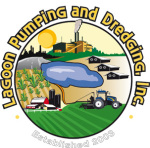
When Should You Pump?
When Should You Pump?
When to pump a lagoon is determined by regulatory, economic, cost saving benefits of the nutrients to the producer and/or farmer, and the seasonal availability of land to incorporate the effluent into. The critical time to pump is when the lagoon can no longer hold the liquid between pumping events due to loss of capacity by solids.
Regulatory
The EPA and state DEQ's are increasingly putting more restrictions on CAFO’s on how and where animal waste is stored and disposed of. There is often huge fines for manure overflows or spills. These regulations are often a real reason to get lagoons pumped sooner rather than later. How long one waits is determined by existing solid levels, availability of land to apply effluent to, and the avoidance of regulatory fines.
Economic
The cost of pumping is often a deterrent to having a lagoon pumped. Many producers want to postpone the cost until it is mandatory to do something about it. This could be due to lower commodity prices, market slaughter prices, or due to repayment of capital costs.
However, by postponing the pumping you are actually spending more than taking care of the pumping on a regular or frequent basis. By pumping every year or every few years you can use the nutrient rich effluent to offset ones commercial fertilizer costs. In addition, one can spread out the cost from year to year so the ongoing costs are never overwhelming.
If an operation is a producer of manure effluent but does not have farm land to utilize the economic savings you can export the product and sell it to the farmer. Farmers are often willing to pay a percentage of the N-P-K value depending upon what they normally would buy through their local co-ops. Lagoon Pumping helps you broker or sell your excess effluent at no extra cost when we pump your lagoons.
Cost Savings Value of Nutrients
Animal waste contains valuable macro and micro nutrients that are easily used to offset or replace the purchase of commercial fertilizers. The N-P-K value of your effluent is determined by type of animal waste, type of food fed to animals, percentage of solids in the effluent product and how the effluent is utilized (injection vs. surface application). The cost savings by not having to purchase commercial fertilizer can help offset if not totally cover the pumping costs.
Seasonal Availability of Land
Incorporation of effluent is done on crop land prior to planting or after harvest. Sometimes a farmer has fallowed ground, pasture or non-irrigated dry land that can be used during the normal growing season. If you have the ability to pump during the normal growing season you can often save a few dollars in pumping costs.
Lagoon Pumping & Dredging, Inc.
For information, quotes and sales: Call the representative for your area:
North East: NE, SD, IA, N-MO, NE-KS: (402) 270-1366 (Brian Jakub)
South West: W-TX, NM, W-OK, CO, WY, MT, W-KS: (763) 355-4099 (Steve Larson)
South East: E-TX, E-OK, S-MO, SE-KS, LA, MS, AR (405) 406-7979 (Jason Lee)
Main Office: (402) 563-3464 (Accounting, Emergencies, Management)

